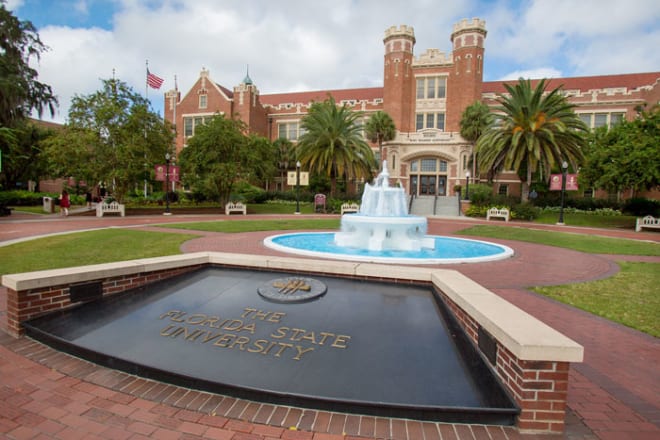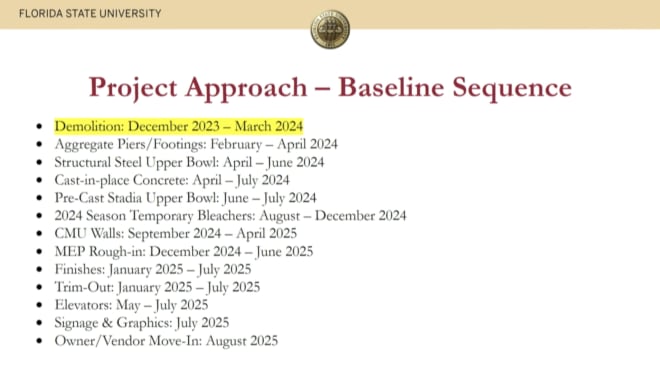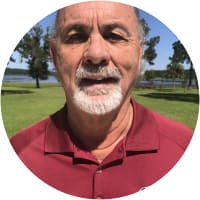Notes: FSU's legal push to bring documents into public view, Doak updates

The Florida State Board of Trustees meeting on Thursday covered a broad agenda of university projects without mention of the lawsuit between the FSU BOT and the Atlantic Coast Conference, despite having filed a brief in opposition to the ACC’s Motion to Seal ESPN Agreements at 9:45 a.m. on Thursday.
This is just the latest in what will likely be many motions and objections in a contentious case between FSU and the ACC, where each party has much at stake.
At issue for Florida State is the Media Rights Agreement the ACC negotiated with ESPN, which beginning in 2024 will pay each ACC school $30 million per team per year less than its peer schools in the Southeastern Conference, and as much as $40 million less than Big Ten schools will realize with the agreement negotiated by the Big Ten. FSU also alleges the exit fee and media rights penalty for leaving — estimated at $570 million in the FSU complaint — are unconscionable and therefore illegal under Florida law.
The ACC’s Motion to Seal was filed along with a complaint for a Declaratory Judgement on December 21, 2023, asking the judge to seal allegedly sensitive information related to an Amended Multimedia Agreement and Network Agreement (collectively, "the Agreements") between the ACC and ESPN, Inc. and ESPN Enterprises, Inc ("ESPN").
The introduction to the FSU BOT objection to sealing those documents follows: “In its Motion to Seal, the ACC asks this Court to shield information from the public about the contracts the ACC entered into with ESPN (the “ESPN Agreements”) for the television rights on behalf of and for the benefit of its members – nine of which are public universities. In doing so, the ACC claims that its request concerns “highly confidential information” belonging to the ACC. But, as discussed below, the terms of the ESPN Agreements belong in the first instance to the members — including its nine public university members. And, in turn, at least in the States of Florida and North Carolina (where public ACC members the University of North Carolina and North Carolina State University are located), the public has a right by law to see their terms.
“Moreover, the vast majority of the information that the ACC is seeking to file under seal is not taken from specific terms in the ESPN Agreements. Rather, the ACC seeks to hide generic descriptions and characterizations about those Agreements, which have been the subject of widespread reporting in the public domain for many years. Indeed, a review of the proposed redactions in the ACC’s First Amended Complaint (ECF No. 11 (the “Amended Complaint”)) reveals the use of an arbitrary, inconsistent, and overbroad redaction brush.
“Frankly, in addition to an apparent attempt to show ESPN that it tried to keep the ESPN Agreements confidential, the ACC’s Motion to Seal may actually be motivated by its desire not to publicly highlight the unfavorable financial comparison of the media rights deals it negotiated for its members versus the materially more valuable media rights secured by conferences like the SEC and Big Ten, which has also been the subject of widespread reporting. But information cannot be sealed simply because it may be ‘embarrassing.’ ”
FSU’s argument includes:
I. Because the ESPN Agreements Constitute Public Records Under Florida’s and North Carolina’s Public Records Acts, They Cannot Be Sealed from Public View In This Case.
FSU’s lawyers point out both of the ESPN Agreements expressly provide that any confidentiality obligation is subject to the law applicable to each Conference Institution. And there are nine universities within the conference, including in North Carolina and Florida, subject to Public Records laws.
II. The ACC’s Motion to Seal Is Not Narrowly Tailored to Protect the Public’s Interest Because It Includes Generic Information Already Publicly Known and in Some Instances, Disclosed by the ACC.
In this argument, FSU asserts: “the information that the ACC is seeking to file under seal is either generic or has been the subject of widespread reporting and is generally known by both the interested public and the ACC’s competitors. As such, “there is no confidentiality left to preserve.”
A. The Redacted Versions of the ESPN Agreements Submitted to the Court Do Not Reveal Any Non-Public Information.
Under this heading FSU presents charts showing the subject of the redaction in one column and in another column examples of where that information has been made public.
B. The Proposed Redactions in the Amended Complaint Are Arbitrary, Inconsistent, Generic, and Publicly Known.
C. The FSU Board’s Complaint and Amended Complaint Against the ACC Are Publicly Available.
Under this heading, FSU states that the ACC “never asked the Court in Florida to seal any portion of either of the FSU Board’s Complaints for Declaratory Judgment (original and amended complaints); and both are publicly available online (see FSU-ACC lawsuit).
Conclusion
“Because the ACC seeks to seal from public view information and documents that are public records that must be disclosed under applicable law, much of which is generic and already in the public domain, the ACC’s Amended Motion to Seal should be denied.”
Unable to resolve the years-long dispute over revenue between the Florida State University Board of Trustees and the ACC through negotiations, and knowing FSU was preparing to file suit against the ACC, the conference filed a complaint for a Declaratory Judgement on Dec. 21 in Mecklenburg County, Charlotte, N.C., with the FSU BOT voting to file its complaint for a Declaratory Judgement against the ACC hours later.
It is believed that the FSU BOT and ACC have until Feb. 16 to respond to the amended complaints for Declaratory Judgement.
FSU BOT vs. ACC timeline to date
December 21 — ACC files initial complaint for Declaratory Judgement and a Motion to Seal, both in Mecklenburg County
December 22 — FSU files initial complaint for Declaratory Judgement in the 2nd Judicial Circuit in Leon County
January 17, 2024 — ACC files an amended complaint for Declaratory Judgement, alleging multiple breaches of contract.
January 29 — FSU files an amended complaint for Declaratory Judgement. This complaint alleges "self-dealing” and specifically points to Commissioner John Swofford’s relationship with Raycom Sports, where his son Chad Swafford was an employee.
February 1 — FSU files a motion to deny the ACC’s Motion to Seal ESPN Agreements.
Notes from BOT meeting
FSU president Richard McCullough introduced FSU athletics director Michael Alford, noting the program produced a national championship in soccer, a No. 6 finish and ACC Championship in football and importantly was able to fend off Alabama to retain coach Mike Norvell, who won two coach of the year awards.
Alford presented the Board of Trustees with a positive report on athletics, including a glowing academic report and progress on the Dunlap Football Center and Doak Campbell Stadium renovations, which are both underway. “He is an incredibly special person and outstanding coach,” McCullough said, noting his retention means more investment in football.
Alford said the department-wide GPA was 3.212 and that football has broken the program's best academic marks for the third consecutive time. Of the 470-plus student-athletes none are on academic probation.
His fundraising report was positive noting $5.5 million has been raised thus far in the five-year Elevate Campaign for Women, chaired by Hall of Fame Volleyball player Gabriel Reece. The goal is to raise $45 million for women’s facilities, $22 million for scholarships and $8 million in the Coaches Clubs, which are a discretionary fund for each head coach above the sport’s budget.
Stadium update

BOT chairman Peter Collins handed each trustee a piece of Doak Campbell Stadium’s foundation as crews continue to demolish the old structure, which will continue until March 2024. Alford noted that a company has been retained to distribute pieces of the stadium seats and bricks to fans who want to own a piece of Doak.
Piers and footings will start in April, with structural steel for for the upper bowl installed by June. The precast concrete seating for the upper bowl and concrete will be installed by the end of July 2024.
The temporary seating will be installed from August to December 2024, during which time the walls will begin to go up, with completion in April 2025. Rough-in will be completed by June with finishes and trim out, elevators and signage and graphics installed by July. Owner/Vendor move in will be August 2025.
Sales update
Looking forward, he noted 5,000 season ticket holders — who purchase 17,500 west side season tickets — have been impacted by the stadium demolition. Of those 5,000 accounts, 2,960 have been contacted thus far for one-on-one presentations. Of those who have attended the presentation, 22 percent bought the product they were presented while 78 percent chose to wait to see the Chairback Seats or other seating products that have yet to be offered. The Boosters have now sold all eight Founders Suites, the Founders Loges and more than 1,500 of the 2,000 club seats, generating $63 million in revenue.
As they meet with affected donors, some of whom have as many as 10 tickets, they have uncovered 364 “found” donors, people who have been sharing an account for years in either a family member’s name or a close friend.
Alford said the stadium will not be complete until Aug. 2025 and that capacity would be “mid to high 50s” for the 2024 season when temporary bleachers will be installed in the construction site on the west sideline seating 7,500 people.
When asked if the atmosphere would be diminished by reduced capacity, Collins responded. “We were in the Cheez-It Bowl, which has 62,000 and that place was still loud,” he said. In previous meetings, Alford has estimated final capacity of up to 70,000.
Dunlap Football Operations facility
The 150,000-square-foot Dunlap Football Operations Center has begun with a gross maximum price of $138 million. Demolition of the West Annex Building, shoring of the wall at Stadium Drive, and temporary closure of the IPF have begun. The pedestrian tunnel under Stadium Drive will be shut down from March to June. The building foundation will begin on April 1, with steel erection planned to begin on June 6 and topped off Sept. 10.
Collins praised the alignment of leadership. “The relationship between the Boosters, Athletics and the President are real,” Collins said, noting you can accomplish great things when aligned.
University-wide news
President McCullough noted the graduation rate for Florida State approached 99 percent, which is a tribute to the hard work of the students as well as the staff who encourage them. “The work that goes into this, calling every student, this is not luck — this is a lot of hard work,” McCullough said.
The President also reported that the university received 78,000 applications for admission this year, which is more than any university in the state. “We continue to lead in that category,” the president said, slyly. “Not that we are competitive.”
The median SAT score for this incoming freshman class was 1370.
The President said research dollars, which are an important metrics for admission to the AAU, rose from $325 million to $414 million in research expenditures. “Our goal is to get to $500 million next year, which is a stretch goal,” McCullough said.
The president said he loves “big, audacious projects” and credits Vice President for Research Stacey Patterson and her team for securing a $98.4 million award from The Triumph Gulf Coast Board for a project to build advanced manufacturing facilities in Panama City for the aerospace and defense industries.
The university is in the final stages of contract negotiations, which will be completed in an April-May timeframe.
Another metric the AAU looks at is the number of National Academy Award members and Nobel Prize winners a school has on its faculty, which the university is actively recruiting. The school of engineering has added three National Academy members bringing the total to four.
McCullough said the university’s academic fundraising is slightly behind but athletics is ahead of schedule. “The Boosters has been killing it, doing a great job,” McCullough said.
